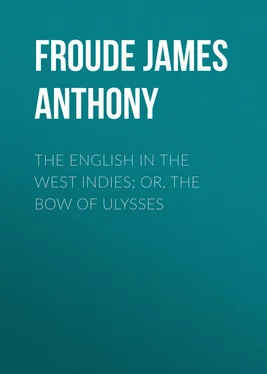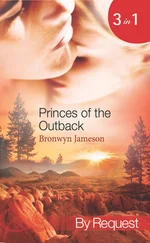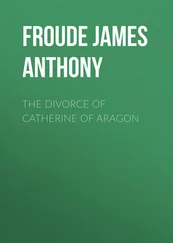James Froude - The English in the West Indies; Or, The Bow of Ulysses
Здесь есть возможность читать онлайн «James Froude - The English in the West Indies; Or, The Bow of Ulysses» — ознакомительный отрывок электронной книги совершенно бесплатно, а после прочтения отрывка купить полную версию. В некоторых случаях можно слушать аудио, скачать через торрент в формате fb2 и присутствует краткое содержание. Жанр: foreign_antique, foreign_prose, Путешествия и география, на английском языке. Описание произведения, (предисловие) а так же отзывы посетителей доступны на портале библиотеки ЛибКат.
- Название:The English in the West Indies; Or, The Bow of Ulysses
- Автор:
- Жанр:
- Год:неизвестен
- ISBN:нет данных
- Рейтинг книги:5 / 5. Голосов: 1
-
Избранное:Добавить в избранное
- Отзывы:
-
Ваша оценка:
- 100
- 1
- 2
- 3
- 4
- 5
The English in the West Indies; Or, The Bow of Ulysses: краткое содержание, описание и аннотация
Предлагаем к чтению аннотацию, описание, краткое содержание или предисловие (зависит от того, что написал сам автор книги «The English in the West Indies; Or, The Bow of Ulysses»). Если вы не нашли необходимую информацию о книге — напишите в комментариях, мы постараемся отыскать её.
The English in the West Indies; Or, The Bow of Ulysses — читать онлайн ознакомительный отрывок
Ниже представлен текст книги, разбитый по страницам. Система сохранения места последней прочитанной страницы, позволяет с удобством читать онлайн бесплатно книгу «The English in the West Indies; Or, The Bow of Ulysses», без необходимости каждый раз заново искать на чём Вы остановились. Поставьте закладку, и сможете в любой момент перейти на страницу, на которой закончили чтение.
Интервал:
Закладка:
Small personalities cropped up now and then. We had representatives of all professions among us except the Church of England clergy. Of them we had not one. The captain, as usual, read us the service on Sundays on a cushion for a desk, with the union jack spread over it. On board ship the captain, like a sovereign, is supreme, and in spiritual matters as in secular. Drake was the first commander who carried the theory into practice when he excommunicated his chaplain. It is the law now, and the tradition has gone on unbroken. In default of clergy we had a missionary, who for the most part kept his lips closed. He did open them once, and at my expense. Apropos of nothing he said to me, 'I wonder, sir, whether you ever read the remarks upon you in the newspapers. If all the attacks upon your writings which I have seen were collected together they would make an interesting volume.' This was all. He had delivered his soul and relapsed into silence.
From a Puerto Rico merchant I learnt that, if the English colonies were in a bad way, the Spanish colonies were in a worse. His own island, he said, was a nest of squalor, misery, vice, and disease. Blacks and whites were equally immoral; and so far as habits went, the whites were the filthier of the two. The complaints of the English West Indians were less sweeping, and, as to immorality between whites and blacks, neither from my companions in the 'Moselle' nor anywhere afterward did I hear or see a sign of it. The profligacy of planter life passed away with slavery, and the changed condition of the two races makes impossible any return to the old habits. But they had wrongs of their own, and were eloquent in their exposition of them. We had taken the islands from France and Spain at an enormous expense, and we were throwing them aside like a worn-out child's toy. We did nothing for them. We allowed them no advantage as British subjects, and when they tried to do something for themselves, we interposed with an Imperial veto. The United States, seeing the West Indian trade gravitating towards New York, had offered them a commercial treaty, being willing to admit their sugar duty free, in consideration of the islands admitting in return their salt fish and flour and notions. A treaty was in process of negotiation between the United States and the Spanish islands. A similar treaty had been freely offered to them, which might have saved them from ruin, and the Imperial Government had disallowed it. How, under such treatment, could we expect them to be loyal to the British connection?
It was a relief to turn back from these lamentations to the brilliant period of past West Indian history. With the planters of the present it was all sugar – sugar and the lazy blacks who were England's darlings and would not work for them. The handbooks were equally barren. In them I found nothing but modern statistics pointing to dreary conclusions, and in the place of any human interest, long stories of constitutions, suffrages, representative assemblies, powers of elected members, and powers reserved to the Crown. Such things, important as they might be, did not touch my imagination; and to an Englishman, proud of his country, the West Indies had a far higher interest. Strange scenes streamed across my memory, and a shadowy procession of great figures who have printed their names in history. Columbus and Cortez, Vasco Nuñez, and Las Casas; the millions of innocent Indians who, according to Las Casas, were destroyed out of the islands, the Spanish grinding them to death in their gold mines; the black swarms who were poured in to take their place, and the frightful story of the slave trade. Behind it all was the European drama of the sixteenth century – Charles V. and Philip fighting against the genius of the new era, and feeding their armies with the ingots of the new world. The convulsion spread across the Atlantic. The English Protestants and the French Huguenots took to sea like water dogs, and challenged their enemies in their own special domain. To the popes and the Spaniards the new world was the property of the Church and of those who had discovered it. A papal bull bestowed on Spain all the countries which lay within the tropics west of the Atlantic – a form of Monroe doctrine, not unreasonable as long as there was force to maintain it, but the force was indispensable, and the Protestant adventurers tried the question with them at the cannon's mouth. They were of the reformed faith all of them, these sea rovers of the early days, and, like their enemies, they were of a very mixed complexion. The Spaniards, gorged with plunder and wading in blood, were at the same time, and in their own eyes, crusading soldiers of the faith, missionaries of the Holy Church, and defenders of the doctrines which were impiously assailed in Europe. The privateers from Plymouth and Rochelle paid also for the cost of their expeditions with the pillage of ships and towns and the profits of the slave trade; and they too were the unlicensed champions of spiritual freedom in their own estimate of themselves. The gold which was meant for Alva's troops in Flanders found its way into the treasure houses of the London companies. The logs of the voyages of the Elizabethan navigators represent them faithfully as they were, freebooters of the ocean in one aspect of them; in another, the sea warriors of the Reformation – uncommissioned, unrecognised, fighting on their own responsibility, liable to be disowned when they failed, while the Queen herself would privately be a shareholder in the adventure. It was a wild anarchic scene, fit cradle of the spiritual freedom of a new age, when the nations of the earth were breaking the chains in which king and priest had bound them.
To the Spaniards, Drake and his comrades were corsarios , robbers, enemies of the human race, to be treated to a short shrift whenever found and caught. British seamen who fell into their hands were carried before the Inquisition at Lima or Carthagena and burnt at the stake as heretics. Four of Drake's crew were unfortunately taken once at Vera Cruz. Drake sent a message to the governor-general that if a hair of their heads was singed he would hang ten Spaniards for each one of them. (This curious note is at Simancas, where I saw it.) So great an object of terror at Madrid was El Draque that he was looked on as an incarnation of the old serpent, and when he failed in his last enterprise and news came that he was dead, Lope de Vega sang a hymn of triumph in an epic poem which he called the 'Dragontea.'
When Elizabeth died and peace was made with Spain, the adventurers lost something of the indirect countenance which had so far been extended to them; the execution of Raleigh being one among other marks of the change of mind. But they continued under other names, and no active effort was made to suppress them. The Spanish Government did in 1627 agree to leave England in possession of Barbadoes, but the pretensions to an exclusive right to trade continued to be maintained, and the English and French refused to recognise it. The French privateers seized Tortuga, an island off St. Domingo, and they and their English friends swarmed in the Caribbean Sea as buccaneers or flibustiers. They exchanged names, perhaps as a symbol of their alliance. 'Flibustier' was English and a corruption of freebooter. 'Buccaneer' came from the boucan, or dried beef, of the wild cattle which the French hunters shot in Española, and which formed the chief of their sea stores. Boucan became a French verb, and, according to Labat, was itself the Carib name for the cashew nut.
War breaking out again in Cromwell's time, Penn and Venables took Jamaica. The flibustiers from the Tortugas drove the Spaniards out of Hayti, which was annexed to the French crown. The comradeship in religious enthusiasm which had originally drawn the two nations together cooled by degrees, as French Catholics as well as Protestants took to the trade. Port Royal became the headquarters of the English buccaneers – the last and greatest of them being Henry Morgan, who took and plundered Panama, was knighted for his services, and was afterwards made vice-governor of Jamaica. From the time when the Spaniards threw open their trade, and English seamen ceased to be delivered over to the Inquisition, the English buccaneers ceased to be respectable characters and gradually drifted into the pirates of later history, when under their new conditions they produced their more questionable heroes, the Kidds and Blackbeards. The French flibustiers continued long after – far into the eighteenth century – some of them with commissions as privateers, others as forbans or unlicensed rovers, but still connived at in Martinique.
Читать дальшеИнтервал:
Закладка:
Похожие книги на «The English in the West Indies; Or, The Bow of Ulysses»
Представляем Вашему вниманию похожие книги на «The English in the West Indies; Or, The Bow of Ulysses» списком для выбора. Мы отобрали схожую по названию и смыслу литературу в надежде предоставить читателям больше вариантов отыскать новые, интересные, ещё непрочитанные произведения.
Обсуждение, отзывы о книге «The English in the West Indies; Or, The Bow of Ulysses» и просто собственные мнения читателей. Оставьте ваши комментарии, напишите, что Вы думаете о произведении, его смысле или главных героях. Укажите что конкретно понравилось, а что нет, и почему Вы так считаете.












